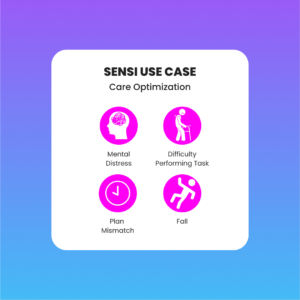At a Glance
Deborah lived alone in a caravan home, and had occasional visits from her nephew. Deborah’s cognitive decline had become steadily worse, and she had trouble going to the bathroom independently. Her situation had grown so bad that Deborah had a series of hospitalizations after falling in the middle of the night. Deborah continued to grow more and more distressed, and her caregiver even arrived promptly for her shift at 7 am to find that Deborah had summoned the fire department. Deborah would be so distressed by the time her caregivers would arrive that she would be incredibly resistant to care, and even violent.
Challenges
Deborah’s situation clearly indicated the need for 24/7 care, but that was something that her family could not afford. The agency had trouble finding the right solution to give her the help she needed, stop the constant trips back and forth from the hospital, and reduce Deborah’s resistance to care.
System Findings

- Sensi’s comprehensive status overview detected the following: Deborah was having repeat instances of Mental Distress throughout the night accompanied by Calls for Help. These instances often included toileting related keywords.
- The data demonstrated that these instances would intensify at around 5am, and Sensi picked up on three Falls that occurred after this pattern of audio notifications.
- Personal care was accompanied by instances of Care Resistance and Intense Interactions.
- Instances of Positive Interactions and Exceptional Care were detected on Monday, Tuesday and Thursday mornings – verified with her care plan to be during hours of a specific caregiver’s visits. This indicates a great client – caregiver match!
- Difficulty Performing Tasks detected for personal tasks.
Data Driven Decisions
Care Plan Adjustment
- Deborah’s care plan was shifted to two hours earlier each day to address her toileting needs.
- Deborah’s shift schedule was adjusted so personal care was performed by the specific caregiver with whom she had a good client/caregiver match.
Training Strategies and Kudos
- The agency gave the caregiver who had been doing an exceptional job kudos, and scheduled her to administer additional training for the other caregivers in personal care for dementia patients.
Impact
Implementing Sensi’s data-based recommendations changed Deborah’s life. While she could not receive 24/7 care, optimizing her care plan to suit her specific needs alleviated her distress over not being able to reach the bathroom independently during night hours. After implementing Sensi’s recommendations and shifting care hours, Deborah did not have any falls or rehospitalizations.
For the caregivers, Deborah’s reduction in Mental Distress and Care Resistance meant less burn out and the ability to conduct have an increase in Positive Interactions and an overall positive working environment. For Deborah’s family, they were overjoyed to be able to provide their loved one with the care she needs, increasing their peace of mind.
